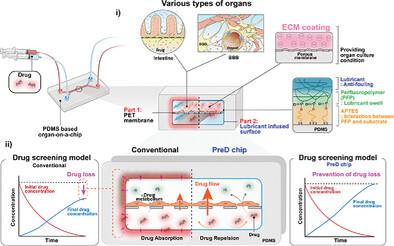Our official English website, www.x-mol.net, welcomes your feedback! (Note: you will need to create a separate account there.)
Lubricant‐Coated Organ‐on‐a‐Chip for Enhanced Precision in Preclinical Drug Testing
Small ( IF 13.0 ) Pub Date : 2024-06-27 , DOI: 10.1002/smll.202402431 Tae Young Kim 1 , Jeong‐Won Choi 2 , Kijun Park 1 , SeungHwan Kim 3 , Jeong F. Kim 3, 4 , Tae‐Eun Park 2 , Jungmok Seo 1, 5
Small ( IF 13.0 ) Pub Date : 2024-06-27 , DOI: 10.1002/smll.202402431 Tae Young Kim 1 , Jeong‐Won Choi 2 , Kijun Park 1 , SeungHwan Kim 3 , Jeong F. Kim 3, 4 , Tae‐Eun Park 2 , Jungmok Seo 1, 5
Affiliation

|
In drug discovery, human organ‐on‐a‐chip (organ chip) technology has emerged as an essential tool for preclinical testing, offering a realistic representation of human physiology, real‐time monitoring, and disease modeling. Polydimethylsiloxane (PDMS) is commonly used in organ chip fabrication owing to its biocompatibility, flexibility, transparency, and ability to replicate features down to the nanoscale. However, the porous nature of PDMS leads to unintended absorption of small molecules, critically affecting the drug response analysis. Addressing this challenge, the precision drug testing organ chip (PreD chip) is introduced, an innovative platform engineered to minimize small molecule absorption while facilitating cell culture. This chip features a PDMS microchannel wall coated with a perfluoropolyether‐based lubricant, providing slipperiness and antifouling properties. It also incorporates an ECM–coated semi‐porous membrane that supports robust multicellular cultures. The PreD chip demonstrates its outstanding antifouling properties and resistance to various biological fluids, small molecule drugs, and plasma proteins. In simulating the human gut barrier, the PreD chip demonstrates highly enhanced sensitivity in tests for dexamethasone toxicity and is highly effective in assessing drug transport across the human blood–brain barrier. These findings emphasize the potential of the PreD chip in advancing organ chip–based drug testing methodologies.
中文翻译:

润滑剂涂层器官芯片可提高临床前药物测试的精度
在药物发现中,人体器官芯片(器官芯片)技术已成为临床前测试的重要工具,提供了人体生理学、实时监测和疾病建模的真实表现。聚二甲基硅氧烷(PDMS)因其生物相容性、灵活性、透明性以及将特征复制到纳米尺度的能力而常用于器官芯片制造。然而,PDMS 的多孔性质会导致小分子的意外吸收,严重影响药物反应分析。为了应对这一挑战,我们推出了精密药物检测器官芯片(PreD芯片),这是一种创新平台,旨在最大限度地减少小分子吸收,同时促进细胞培养。该芯片具有涂有全氟聚醚基润滑剂的 PDMS 微通道壁,具有光滑性和防污性能。它还包含 ECM 涂层的半孔膜,支持强大的多细胞培养。 PreD芯片展示了其出色的防污性能以及对各种生物体液、小分子药物和血浆蛋白的耐受性。在模拟人体肠道屏障时,PreD 芯片在地塞米松毒性测试中表现出高度增强的灵敏度,并且在评估药物穿过人体血脑屏障的转运方面非常有效。这些发现强调了 PreD 芯片在推进基于器官芯片的药物测试方法方面的潜力。
更新日期:2024-06-27
中文翻译:

润滑剂涂层器官芯片可提高临床前药物测试的精度
在药物发现中,人体器官芯片(器官芯片)技术已成为临床前测试的重要工具,提供了人体生理学、实时监测和疾病建模的真实表现。聚二甲基硅氧烷(PDMS)因其生物相容性、灵活性、透明性以及将特征复制到纳米尺度的能力而常用于器官芯片制造。然而,PDMS 的多孔性质会导致小分子的意外吸收,严重影响药物反应分析。为了应对这一挑战,我们推出了精密药物检测器官芯片(PreD芯片),这是一种创新平台,旨在最大限度地减少小分子吸收,同时促进细胞培养。该芯片具有涂有全氟聚醚基润滑剂的 PDMS 微通道壁,具有光滑性和防污性能。它还包含 ECM 涂层的半孔膜,支持强大的多细胞培养。 PreD芯片展示了其出色的防污性能以及对各种生物体液、小分子药物和血浆蛋白的耐受性。在模拟人体肠道屏障时,PreD 芯片在地塞米松毒性测试中表现出高度增强的灵敏度,并且在评估药物穿过人体血脑屏障的转运方面非常有效。这些发现强调了 PreD 芯片在推进基于器官芯片的药物测试方法方面的潜力。











































 京公网安备 11010802027423号
京公网安备 11010802027423号